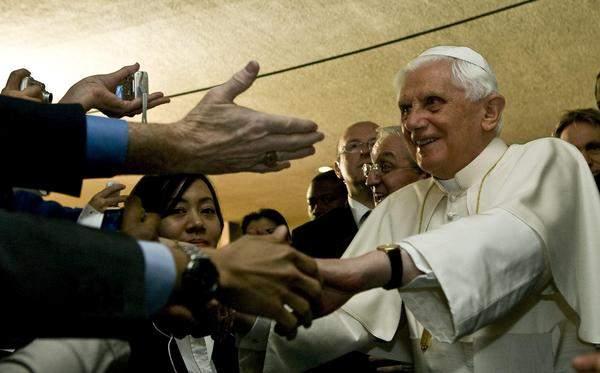Journal News
April 19, 2011
http://www.lohud.com/article/20080419/OPINION/804190315/Hope-healing?odyssey=nav%7Chead
 |
| Pope Benedict XVI greets people at United Nations headquarters on Friday. |
The Lower Hudson Valley today welcomes a pontiff with appreciative high marks from the faithful for confronting head-on the most controversial issue facing the Catholic Church in America, the still-festering wounds of the child sexual-abuse scandal involving clergy, many protected for years, even decades, by pastors and bishops. Pope Benedict XVI has acknowledged the widespread suffering at virtually every stop in his six-day U.S. tour. His words answer long-standing criticism that the Vatican has been indifferent to the scars left by the scandal.
A Mass this morning at St. Patrick's Cathedral in Manhattan for priests, deacons and religious orders offers more opportunity for healing; calls remain for an unambiguous statement from Benedict that the church will no longer protect culpable clergy. A meeting planned this afternoon with young people and seminarians at St. Joseph's Seminary in Yonkers offers Benedict a chance to build on an earlier statement, that "it is more important to have good priests than many priests."
Speaking at the United Nations yesterday, Benedict told diplomats that respect for human rights was the key to addressing many of the world's ills, while counseling against unilateralism. He said the decisions of "a small number" threaten international cooperation - a message he would have had chance to amplify in a private meeting with President Bush at the start of his tour. The two discussed the war in Iraq, fighting terrorism, a humane immigration policy and the Israel-Palestinian conflict, according to a joint statement.
But gaining the most notice was a private meeting Thursday with victims of sex abuse by priests. The unannounced meeting offered the pope an unobstructed view of the personal pain and crisis of faith brought by the betrayals. In a religion that invests so much in symbolism, the pontiff's decision to hold the meetings with Boston-area victims was significant; in no place was the abuse so rampant, and the church's response so negligent. This private discussion came after Benedict addressed the topic in perhaps the most public forum possible - his first American Mass, before 47,000 people, at the new Washington Nationals baseball stadium.
Some critics say that the pope still needs to outline specific punishment not only for offending priests, but also those who protected abusers from sanction.
On Catholic education
Benedict has had more to say about the future. His emphasis on access to Catholic education, especially for immigrants and the underprivileged, strikes a chord with Lower Hudson Valley families. The Archdiocese of New York will close another six elementary schools in June, including two in Westchester, two in Rockland and one in Putnam. On Thursday, the pope called for a renewed commitment to Catholic education in an address to Catholic education leaders. "I expect that for some bishops who are struggling with the life of schools in their dioceses, it was probably hard to hear," Stephen J. Sweeny, president of the College of New Rochelle, told Journal News religion writer Gary Stern. Benedict also addressed the tough balancing act between academic freedom at religious institutions, and keeping lessons in line with the faith and teachings of the church.
Meetings with leaders of other Christian denominations, and Jewish leaders, including yesterday's first papal visit to a synagogue in this country, have opened up opportunities for understanding and dialogue. The pope, a guardian of church orthodoxy, has caused upset among Jews by reviving a Good Friday prayer's call for conversion, and among other Christians by restating that the Catholic Church is the "one true church." A 2006 speech by Benedict, quoting from a 14th Century Byzantine emperor about Muhammad, offended Muslims worldwide. Benedict later apologized for reviving a quotation that he said did not express his views.
Could it be that popes, like other international leaders, can grow into the complex nuances of the job? Benedict's tough discussions this trip, including frank talk about the pain the church has inflicted on abuse survivors, reveal that he is advancing on the learning curve.
Any original material on these pages is copyright © BishopAccountability.org 2004. Reproduce freely with attribution.